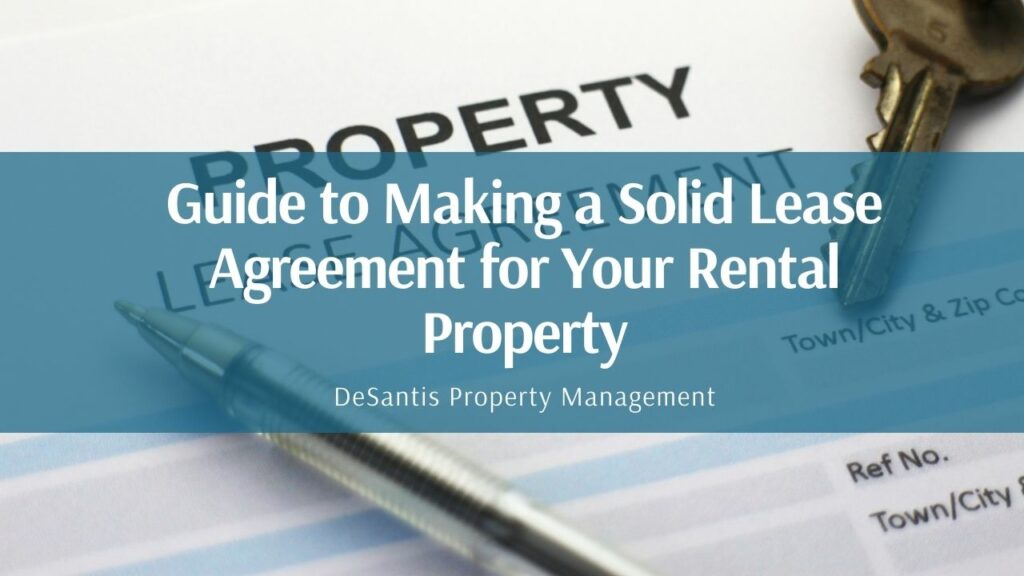
A lease agreement is a must-have for any landlord. As a landlord, it enables you to spell out your policies, clauses, disclosures, and even the expectations you have of the tenant.
And being legally binding, it means that you can take legal action against a tenant for violating any of its terms. For example, if a tenant fails to make timely rent payments, you can terminate their lease and, if necessary, take the tenant through a judicial eviction process to recoup your losses.
It goes without saying that a lease needs to be written in a clear and concise language in order to be effective.
In today’s article, we’ll share with you 7 tips on how to make a solid lease agreement for your rental property.
1. Names of All Adult Tenants
The lease should capture the names of all adult tenants who will be living in the unit. This should include both married and unmarried couples. Doing this will provide you with additional insurance, as every tenant will become legally liable for the terms of the lease.
For instance, if rent goes unpaid, you can legally seek it from any of the listed tenants. Similarly, if one tenant violates a lease term, you may be able to terminate the lease for all occupants.
2. The Limits on Occupancy
This clause will help you clarify who the tenant is to avoid issues down the road. It is recommended to state that the only people allowed to inhabit the property are the listed tenants and their children.

This requirement will help you deal with unwanted guests. As such, if a tenant moves in an unapproved sublet or roommate, you’d have the right to terminate the lease.
3. The Term of the Tenancy
As a landlord, you get to choose either a rental agreement or lease agreement. A rental agreement usually runs month to month until either party terminates it. A lease agreement is long-term. It can run anywhere from 6 months to a year.
Whichever you choose, make sure to be specific. Have the agreement capture the start and the end date of the term. Neglecting this step may result in having a holdover tenant. This is a tenant that continues to rent after their lease has expired, which can be a difficult situation to resolve.
4. The Dollar Amount of Rent
And don’t just state the dollar amount and stop there. Get further into the nitty-gritties. Make sure you state the following important details to avoid potential issues:
- When rent is due. Normally, this is usually on the 1st of every month. You may also specify any grace periods.
- How it is to be paid. Will you require them to come to the office? Or, will it be through the mail or online?
- Whether you charge late fee rents.
- What happens if a rent check bounces?

You may also want to state the security deposit and other fees. When considering security deposits, make sure to abide by the state limit. Pennsylvania limits charges based on the length of a tenancy.
- In the first year of the lease, the maximum you can collect is capped at two months’ rent.
- For tenants who’ve rented for 2 years or more but less than 5, you can only charge them a maximum of one month’s rent.
- For tenants who have rented for at least 5 years, you must not increase the limit further even if the rent hikes.
5. Explain Your Repair and Maintenance Policies
Let your tenant know about what their responsibilities are in regards to repairs and maintenance. Some common responsibilities tenants in Pennsylvania have include the following:
- Keep the unit clean and sanitary
- Respect the peace and quiet of neighbors
- Care for their rented premises by not causing careless or negligent property damage
- Not to permit any person to damage or destroy any part of the property
- Repair any damage they have caused to the unit
- Keep all fixtures clean and in proper working order
- Remove all hazards and garbage
You may also want to take them through what each of such maintenance responsibilities entail.

6. Have a Clause on Landlord Entry
This is your best defense against potential landlord harassment claims. As a landlord, you have a right to enter your tenant’s rented premises to carry out important responsibilities. Such responsibilities include:
- To inspect the unit.
- To show the unit to interested tenants or buyers.
- Under orders of the court.
- To serve important notices.
However, before doing so, you must serve your tenant an advance notice. In Pennsylvania, you must provide your tenant an advance notice of 24 hours prior to entering their rented unit.
7. Make Important Disclosures on Your Lease
Pennsylvania requires landlords to disclose certain information to potential tenants prior to them moving in. The following are the mandatory disclosures required at both the state and federal level.
- Lead-based disclosure - This is a federal law that requires landlords renting out homes built prior to 1978 to provide tenants with information regarding the use of lead-based paint.
- Utility disclosure - Have you impliedly or expressly agreed in the lease to furnish and pay for utilities to the tenant’s dwelling? If so, you’ll become liable for any utility disruptions that may arise to the tenant’s dwelling as a result of failure to pay the bills.
Bottom Line
While this isn't the only information your lease should contain, it will get you started to draft a solid lease agreement. If you’re looking for expert help, DeSantis Property Management is here to service you.
We’re a professional and experienced property management company in Pittsburg. We can cover all your landlord needs, from marketing your vacant unit, maintaining it, or collecting rent. Get in touch to learn more!

